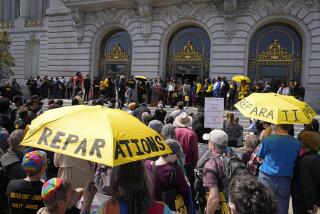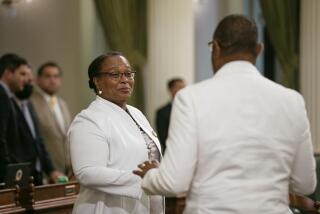U.S., Allies Might Help Iraq Rebuild After War, Baker Says : Persian Gulf: Secretary adds that Baghdad could face reparations after a bloody ground conflict. He also says Iran must have a key peacetime role.
- Share via
WASHINGTON — Secretary of State James A. Baker III said Wednesday that the United States and its allies might help rebuild postwar Iraq, but when pressed by members of Congress, he said reparations might be exacted if Iraq fights to the finish in a bloody ground war.
“The time of reconstruction and recovery should not be the occasion for vengeful actions against a nation forced to war by a dictator’s ambition,” Baker told the House Foreign Affairs Committee. “The secure and prosperous future everyone hopes to see in the Gulf must include Iraq.”
With an eye to U.S. budgetary problems, he added, “Of necessity, most of the resources for reconstruction will be drawn from the Gulf (countries).”
Baker also said the postwar political order in the Gulf must make a place for Iraq, its territorial integrity intact. He said Iran also must be included in postwar planning.
Baker’s comments, contained in his prepared text, seemed aimed less at his Capitol Hill audience than at mounting concern in the Middle East that the U.S.-led military assault will go beyond demolition of Iraqi military power and destroy Iraq as a viable country.
In a dinner speech Wednesday at the New York Economic Club, President Bush touched on the same theme, saying “the road to real peace will be long and tough. But we will prevail. And when we do, we will have before us an historic opportunity. From the confluence of the Tigris and Euphrates, where civilization began, civilized behavior can begin anew.
“In the final analysis, America and her partners will be measured not by how we wage war but how we make peace,” Bush said.
But earlier in the day, most members of the House committee insisted that the United States exact harsh terms once it defeats Iraq, either demanding financial reparations or putting Iraqi leaders on trial for war crimes or both.
Although Baker cautioned against hardening U.S. war aims, he said the allies might be more inclined to exact reparations if the war ends in bitter fighting for every inch of Kuwait than if Iraq agrees to withdraw before it is forced out. The U.N. Security Council has already adopted a resolution holding Iraq financially responsible for damage to Kuwait and other states in the region.
“It depends on how the cessation of hostilities comes about--whether it’s by a peace treaty or facts on the ground,” Baker said.
He said Iran, as the largest country in the Persian Gulf region, must play a key role in the postwar security of the region. That is a sharp change from the U.S. attitude during the eight-year Iran-Iraq War, when Washington tilted toward Iraq in an effort to diminish Iranian influence.
Presidential spokesman Marlin Fitzwater seemed to underline the new sentiment, telling reporters at the White House that if Iran “can help convince (Iraqi President) Saddam Hussein to pull out of Kuwait, so much the better.”
However, Baker held out little hope that Iran could mediate a peaceful settlement to the war. He said he has been briefed fully on Iran’s current diplomatic efforts. When Rep. Olympia J. Snowe (R-Me.) asked if the Iranian initiative contained anything of value, Baker said, “Nope.”
Baker spent much of his 2 1/2-hour appearance fending off complaints that the nation’s allies are not paying their fair share of the cost of the conflict. He said Saudi Arabia, the exiled government of Kuwait, Japan, Germany, the United Arab Emirates and some other donors have already pledged $9.7 billion to defray American costs for the final three months of last year, and more than $41 billion to pay for the war through the end of March.
“You’re beginning to talk about real money when you get to $51 billion,” Baker told one dubious lawmaker. “We have no reason to believe that any one of them will renege on their pledges.”
He said more than $6.5 billion is already in hand. He said it is reasonable to give the donors time to come up with the rest of the money because some of them must obtain some sort of legislative approval of expenditures.
Baker said allied pledges covered more than 80% of the $11 billion the Pentagon spent on the Persian Gulf buildup last year. He said the Bush Administration has adopted that 80-20 split as a rough goal for the far more costly war, although he said the U.S. share could be as low as 12% or as high as 26%.
To require the allies to pay all of the costs would turn the U.S. military establishment into a mercenary force, he said. And that, he added, would be a mistake.
However, many of the committee members were unconvinced. They described the $6.5 billion already collected as little more than a drop in the bucket.
Responding to questions after the speech in New York, Bush defended the contributions of Germany--$9 billion pledged--and Japan--more than $11 billion pledged--to Operation Desert Storm, and said their post-World War II laws blocks more direct involvement in military operations.
“The concept of burden-sharing is in far better control than we’ve made clear,” the President said. “We should not be saying to them, ‘You’ve got to do more in the way of tanks and planes and military force.’
“In terms of the long run, it is my hope that because we’ve taken the lead role, the people of Germany and the people of Japan . . . will see a United States that has a vastly restored credibility” and that this will help improve U.S. economic relations with these nations.
Perhaps, he said, the U.S. willingness to take a leading role in the military operation will give the nation “leverage on them that will lead to more harmonious trading relationships.”
California Rep. Tom Lantos (D-San Mateo) coupled a scathing attack on U.S. allies with a demand that Washington force Iraq to pay war reparations covering the difference between allied contributions and total costs.
“I believe I speak for the overwhelming majority of my colleagues on both sides of the aisle in expressing the most profound disappointment in the burden-sharing that has ensued thus far,” Lantos said.
Lantos said he will introduce legislation seizing Iraq’s oil resources to pay the rest of the cost after “you have collected every dime that we feel should be collected from the ones who benefit from this.”
Baker appeared to have been taken by surprise by the suggestion. He promised to consider the Lantos bill, although he said it may be a mistake to “enlarge or enhance our goals and war aims.”
British Foreign Secretary Douglas Hurd said Wednesday that he also will visit the Gulf this weekend seeking ideas to create postwar stability.
Hurd insisted, however, that any postwar arrangements in the Gulf must be at the initiative of the Arab states themselves and that neither Britain nor the United States will seek to impose their ideas for a new order in the area.
The Anglo-American policy in the wake of the presumed successful effort to force Iraqi forces out of Kuwait will be, Hurd said, “to bring the boys home as soon as possible.”
Times staff writers James Gerstenzang in New York and William Tuohy in London contributed to this article.
LOOKING AHEAD
Secretary of State James A. Baker III outlined some ideas for a postwar peace in the Middle East. Among his comments before Congress:
AID: The U.S.-led coalition may aid Iraq in reconstruction efforts.
U.S. PRESENCE: The U.S. does not intend to maintain a permanent ground presence in the Arabian peninsula once Iraq is ousted from Kuwait.
TRANSITION: There may be a transition phase, perhaps involving a force of local troops under Gulf Cooperation Council or U.N. auspices.
STABILITY: A major postwar goal will be greater stability for the region. Iran, as the largest country in the Persian Gulf region, should play a key part in that.
ENERGY: The U.S. must do more to reduce its energy dependence.
Source: Los Angeles Times, Reuters
More to Read
Get the L.A. Times Politics newsletter
Deeply reported insights into legislation, politics and policy from Sacramento, Washington and beyond. In your inbox twice per week.
You may occasionally receive promotional content from the Los Angeles Times.










